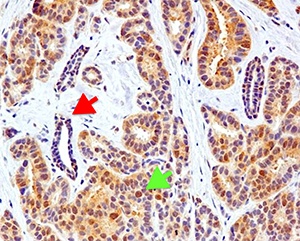
Microscopy image showing SPINK1 expression (brown) in breast tissue. SPINK1 is highly expressed in breast tumor tissue (green arrow) but not in adjacent normal breast tissue (red arrow).
© 2011 EMBO
Proteins associated with enhanced tumor aggressiveness could be potential therapeutic targets to fight cancer. An international team of researchers led by Edison Liu at the A*STAR Genome Institute of Singapore has now discovered that serine protease inhibitor Kazal-type 1 (SPINK1), a secreted protein, plays a key role in tumor aggressiveness in breast cancer.
Researchers have been seeking novel molecular targets for antibody-based and molecule-based drugs treatments for breast cancer in order to combat the cancer’s increased resistance to common drug treatments. In their search for factors that correlate with poor patient survival, Liu and his co-workers performed a whole-genome analysis on four groups comprising 800 breast cancer patients. They were looking for possible drug targets, such as cell surface receptors, secreted growth factors, and genes encoded with extracellular proteins.
The analysis turned up SPINK1, a secreted protein linked to the recurrence of cancer spread in all of the patient groups. Extending this analysis to publicly available data for breast cancer patients in ten other studies, Liu and his team were able to confirm the link between SPINK1 expression and poor prognosis in eight of these studies.
SPINK1 is a protein commonly expressed in digestive organs and tissues, such as the pancreas, where its primary role is the inhibition of digestive enzymes. SPINK1 is not expressed in normal human breast tissue, but Liu’s team found that it was present in breast tumors (see image).
In cell culture experiments, the researchers showed that reducing the expression of SPINK1 in breast cancer cells normally expressing high levels of the protein in turn reduces cancer cell survival. Increasing SPINK1 levels in breast cancer cells, on the other hand, confers drug resistance to the cancer cells. Liu links his findings to a drop in the expression of proteins that mediate cell death, and an increase in the expression of proteins that keep cells alive.
Enhancing the expression of SPINK1 in breast cancer cells in mice accelerated the migration of cancer cells and increased tumor spread. The researchers argue that this could account for the link between SPINK1 expression and cancer recurrence in their patient groups, and are currently seeking to identify the receptor through which SPINK1 acts.
“SPINK1 has already been implicated in prostate cancer,” explains Liu, “but our work generalizes the importance of this molecule to the virulence of breast cancers as well.” The findings suggest that blocking the expression or activity of SPINK1 in breast cancer cells could be a potential therapy for breast cancer.
The A*STAR-affiliated researchers contributing to this research are from the Genome Institute of Singapore.



